【精品】英语一般将来时用法总结(完整)
- 格式:doc
- 大小:64.00 KB
- 文档页数:8
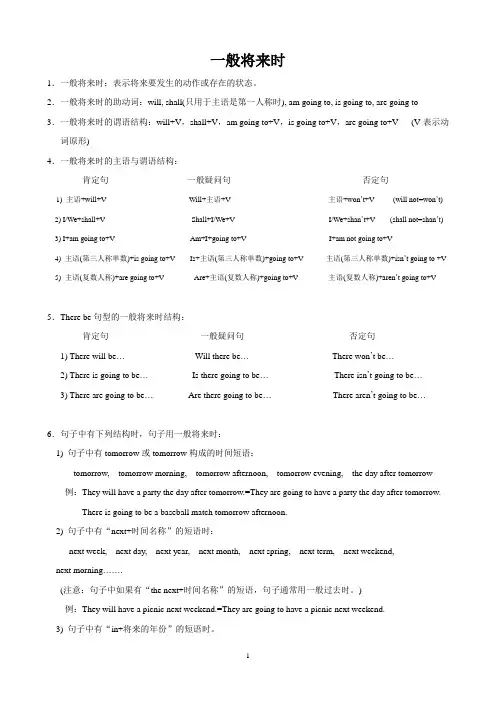
一般将来时1.一般将来时:表示将来要发生的动作或存在的状态。
2.一般将来时的助动词:will, shall(只用于主语是第一人称时), am going to, is going to, are going to3.一般将来时的谓语结构:will+V,shall+V,am going to+V,is going to+V,are going to+V (V表示动词原形)4.一般将来时的主语与谓语结构:肯定句一般疑问句否定句1) 主语+will+V Will+主语+V 主语+won’t+V (will not=won’t)2) I/We+shall+V Shall+I/We+V I/We+shan’t+V (shall not=shan’t)3) I+am going to+V Am+I+going to+V I+am not going to+V4) 主语(第三人称单数)+is going to+V Is+主语(第三人称单数)+going to+V 主语(第三人称单数)+isn’t going to +V5) 主语(复数人称)+are going to+V Are+主语(复数人称)+going to+V 主语(复数人称)+aren’t going to+V5.There be句型的一般将来时结构:肯定句一般疑问句否定句1) There will be…Will there be…There won’t be…2) There is going to be…Is there going to be…There isn’t going to be…3) There are going to be…Are there going to be…There aren’t going to be…6.句子中有下列结构时,句子用一般将来时:1) 句子中有tomorrow或tomorrow构成的时间短语:tomorrow, tomorrow morning, tomorrow afternoon, tomorrow evening, the day after tomorrow 例:They will have a party the day after tomorrow.=They are going to have a party the day after tomorrow.There is going to be a baseball match tomorrow afternoon.2) 句子中有“next+时间名称”的短语时:next week, next day, next year, next month, next spring, next term, next weekend,next morning…….(注意:句子中如果有“the next+时间名称”的短语,句子通常用一般过去时。
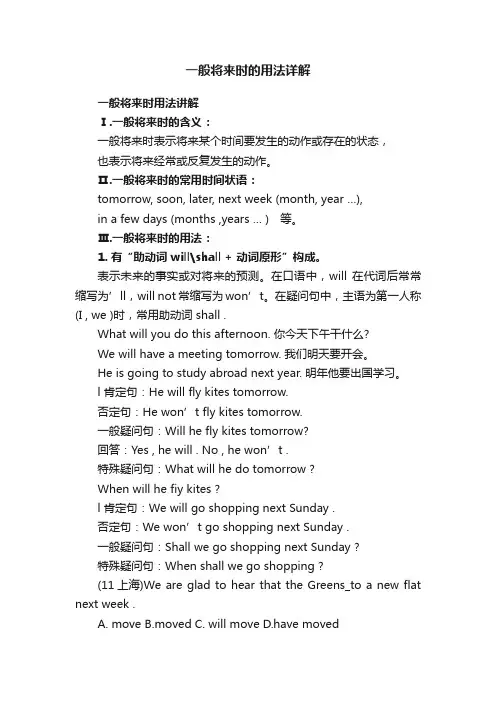
一般将来时的用法详解一般将来时用法讲解Ⅰ.一般将来时的含义:一般将来时表示将来某个时间要发生的动作或存在的状态,也表示将来经常或反复发生的动作。
Ⅱ.一般将来时的常用时间状语:tomorrow, soon, later, next week (month, year …),in a few days (months ,years … )等。
Ⅲ.一般将来时的用法:1. 有“助动词 will\shall + 动词原形”构成。
表示未来的事实或对将来的预测。
在口语中,will 在代词后常常缩写为’ll,will not 常缩写为won’t。
在疑问句中,主语为第一人称(I , we )时,常用助动词 shall .What will you do this afternoon. 你今天下午干什么?We will have a meeting tomorrow. 我们明天要开会。
He is going to study abroad next year. 明年他要出国学习。
l 肯定句:He will fly kites tomorrow.否定句:He won’t fly kites tomorrow.一般疑问句:Will he fly kites tomorrow?回答:Yes , he will . No , he won’t .特殊疑问句:What will he do tomorrow ?When will he fiy kites ?l 肯定句:We will go shopping next Sunday .否定句:We won’t go shopping next Sunday .一般疑问句:Shall we go shopping next Sunday ?特殊疑问句:When shall we go shopping ?(11上海)We are glad to hear that the Greens_to a new flat next week .A. moveB.movedC. will moveD.have moved( ) Who _____ we ____ swimming with tomorrow afternoon?A. will; goB. do; goC. will; goingD. shall; go2. 由“be going to + 动词原形”构成。
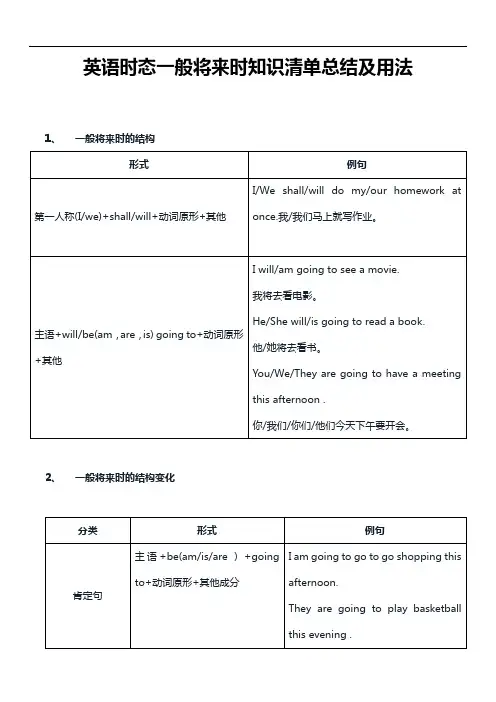
英语时态一般将来时知识清单总结及用法1、一般将来时的结构2、一般将来时的结构变化3、知识要点一般将来时的用法(1) 表示将来的动作或状态,常与tomorrow,this evening. next Monday (week,month,year,in ten minutes,someday,in 2018,in the future 等单词或短语连用。
如:They say that the weather will be good tomorrow. 据说明天是好天气。
I shall have supper soon. 我要吃晚饭了。
There will be a class meeting this afternoon. 今天下午开班会。
He will come to see you next Monday . 他下周一会来看你。
(2) 表示即将发生的或最近打算进行的事,常用“be going to+动词原形”。
如:How are you going to spend your holiday ? 你们打算怎样度假?(3) 表示按计划即将发生的动作,常用go,come,start,move,leave等动词的进行时态。
如:He is coming in a minute . 他很快就来。
(4) 表示按计划要发生的事或征求对方意见,或表示安排、命令、预定好要做的事情,常用“be to+动词原形”。
如:The concert is to take place on Friday evening . 音乐会要在下星期五举行。
(5)表示即将发生的动作,或者表示立刻要做的事情,近在眼前的将来,常用“be about to+动词原形”。
如:Hurry up! The train is about to leave . 快点!火车马上要开了○(6) 一般将来时中be going to结构与will的异同点:①be going to结构和will的相同点:都表示将来的动作或状态。
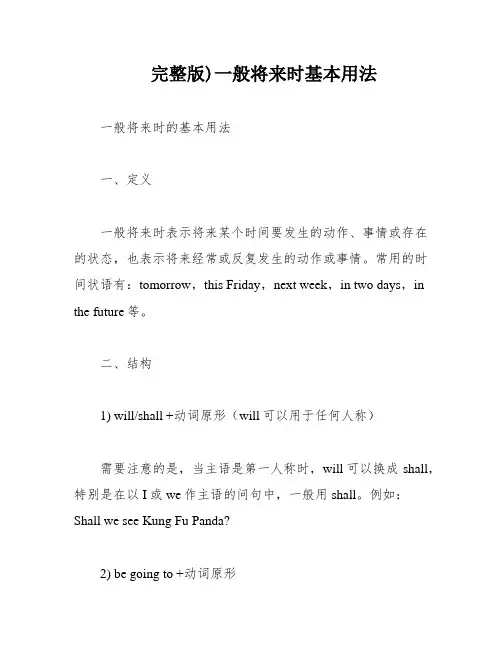
完整版)一般将来时基本用法一般将来时的基本用法一、定义一般将来时表示将来某个时间要发生的动作、事情或存在的状态,也表示将来经常或反复发生的动作或事情。
常用的时间状语有:tomorrow,this Friday,next week,in two days,in the future等。
二、结构1) will/shall +动词原形(will可以用于任何人称)需要注意的是,当主语是第一人称时,will可以换成shall,特别是在以I或we作主语的问句中,一般用shall。
例如:Shall we see Kung Fu Panda?2) be going to +动词原形例如:I’m going to play the piano。
be going to和will的区别be going to和will的用法虽然都表示将来发生动作或情况,一般情况下能互换。
但它们的用法是有区别的。
be going to主要用于:1、表示事先经过考虑、安排好打算、计划要做的事情。
例如:Dad and I are going to watch an opera this afternoon.2、表示根据目前某种迹象判断,某事非常有可能发生。
例如:Look。
There come the dark clouds。
It is going to rain.三、一般疑问句和否定句一般疑问句:1) will/shall +动词原形(will可以用于任何人称)——在will后加not2) be going to +动词原形——在be后加not例如:She will come back in three days.Will she not come back in three days?They are going to clean their classroom.Are they not going to clean their classroom?否定句:1) will/shall +动词原形(will可以用于任何人称)——将will提前2) be going to +动词原形——将be提前例如:She will come back in three days.She will not come back in three days.Will she come back in three days?XXX is whether they will actually do it。

一般将来时的12种表现形式(附词典例句)以下例句均出自词典(有标注)1.will /shall do 其中shall多用于第1人称;will可用于第2/3/1人称2.be going to do 表示决定、打算、计划做某事3.be doing4.be to do 表示计划、安排、约定、意图、将要,应该接近于should, ought to等5.be about to do6.be on the point of doing7.be due to do sth预定/预期/预计做某事8.祈使句9.倒装句——全倒装(只用一般过去时、一般现在时)10.情态动词 + do11.主将从现12.一般现在时的形式——表达将来的含义以下具体分述。
一般将来时的表现形式:以下例句均出自词典或高考真题(有标注)1.will /shall do 其中shall多用于第1人称;will可用于第2/3/1人称表示将要发生的动作或存在的状态表示倾向、习惯、必然发生的事shall用于第2/3人称,表示意志/决心/规定/必然性A meeting will be held next Tuesday at 3p.m.下星期二下午3点将召开一个会议(朗文5p2895)What time will she arrive? 她什么时候到达?(朗文5p2895)Trish will keep asking silly questions.特里斯老是不停地问一些愚蠢的问题。
(表示习惯,同上)Oil will float on water. 油总是浮于水面。
(表示总是、必然,朗文5p2895)Accidents will happen. 意外总是难免的。
(表示总是、惯于,朗文5p2895)We shall be away next week. 我们下周要出去。
(朗文5p2307)I’ve never liked her and I never shall. 我从来都不喜欢她,以后也不会。
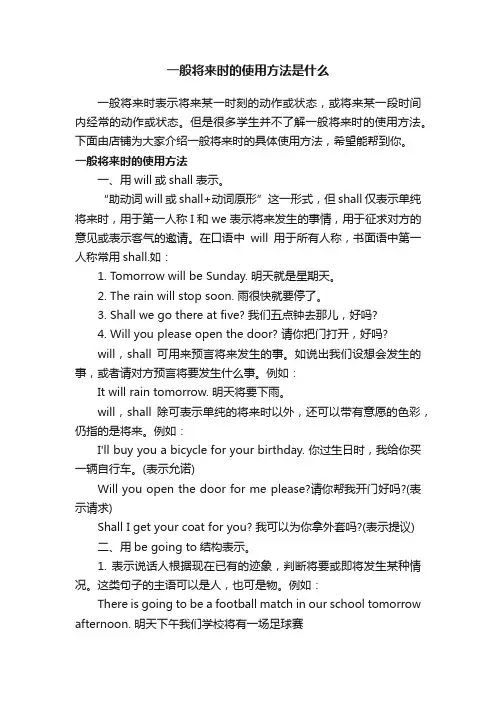
一般将来时的使用方法是什么一般将来时表示将来某一时刻的动作或状态,或将来某一段时间内经常的动作或状态。
但是很多学生并不了解一般将来时的使用方法。
下面由店铺为大家介绍一般将来时的具体使用方法,希望能帮到你。
一般将来时的使用方法一、用will或shall表示。
“助动词will或shall+动词原形”这一形式,但shall 仅表示单纯将来时,用于第一人称I和we表示将来发生的事情,用于征求对方的意见或表示客气的邀请。
在口语中will用于所有人称,书面语中第一人称常用shall.如:1. Tomorrow will be Sunday. 明天就是星期天。
2. The rain will stop soon. 雨很快就要停了。
3. Shall we go there at five? 我们五点钟去那儿,好吗?4. Will you please open the door? 请你把门打开,好吗?will,shall可用来预言将来发生的事。
如说出我们设想会发生的事,或者请对方预言将要发生什么事。
例如:It will rain tomorrow. 明天将要下雨。
will,shall除可表示单纯的将来时以外,还可以带有意愿的色彩,仍指的是将来。
例如:I'll buy you a bicycle for your birthday. 你过生日时,我给你买一辆自行车。
(表示允诺)Will you open the door for me please?请你帮我开门好吗?(表示请求)Shall I get your coat for you? 我可以为你拿外套吗?(表示提议)二、用be going to结构表示。
1. 表示说话人根据现在已有的迹象,判断将要或即将发生某种情况。
这类句子的主语可以是人,也可是物。
例如:There is going to be a football match in our school tomorrow afternoon. 明天下午我们学校将有一场足球赛(已有告示)I feel terrible.I think I'm going to die. 我感到难受极了,我想我快不行了。

一般将来时的用法一般将来时(Simple Future Tense)是描述将来发生的事情或计划的一种时态。
在英语中,一般将来时的构成方式比较简单,一般使用助动词“will”或“be going to”来表示将来时态。
除了这两种方式外,还有其他一些用法和注意事项。
本文将详细介绍一般将来时的用法。
一、will的用法1. 表示意愿或决定:我们可以使用will表示即时决定或表示意愿。
例如:- I am thirsty. I will get some water.(我口渴了。
我要去倒些水。
)- He doesn't have a car, so I will lend him mine.(他没有车,所以我会借给他我的车。
)2. 表示预测或推测:will可用来表达对未来情况的推测或预测。
例如:- It's getting cloudy. I think it will rain soon.(天开始多云了。
我觉得很快就会下雨。
)- She is such a talented musician. I'm sure she will become famous one day.(她是一个非常有才华的音乐家。
我相信她总有一天会出名的。
)3. 提供承诺或请求:will也可以用来表示承诺或请求。
例如:- I will definitely help you with your project.(我一定会帮你完成你的项目。
)- Will you please pass me the salt?(请你把盐递给我好吗?)二、be going to的用法1. 表示计划或打算:be going to可以用来表示我们已经有了计划或打算要做某事。
例如:- I am going to visit my parents this weekend.(我打算这个周末去看望我的父母。
)- They are going to open a new restaurant in town.(他们打算在城里开一家新餐厅。
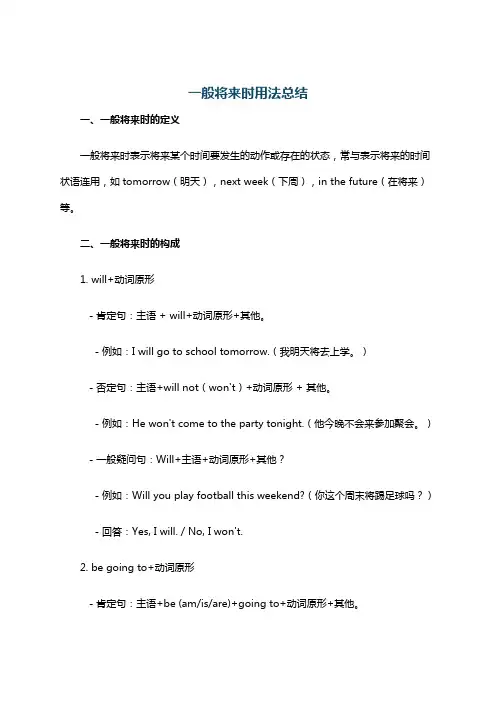
一般将来时用法总结一、一般将来时的定义一般将来时表示将来某个时间要发生的动作或存在的状态,常与表示将来的时间状语连用,如tomorrow(明天),next week(下周),in the future(在将来)等。
二、一般将来时的构成1. will+动词原形- 肯定句:主语 + will+动词原形+其他。
- 例如:I will go to school tomorrow.(我明天将去上学。
)- 否定句:主语+will not(won't)+动词原形 + 其他。
- 例如:He won't come to the party tonight.(他今晚不会来参加聚会。
) - 一般疑问句:Will+主语+动词原形+其他?- 例如:Will you play football this weekend?(你这个周末将踢足球吗?) - 回答:Yes, I will. / No, I won't.2. be going to+动词原形- 肯定句:主语+be (am/is/are)+going to+动词原形+其他。
- 例如:She is going to visit her grandparents next month.(她打算下个月去看望她的祖父母。
)- 否定句:主语+be (am/is/are)+not+going to+动词原形+其他。
- 例如:They are not going to have a meeting this afternoon.(他们今天下午不打算开会。
)- 一般疑问句:Be (am/is/are)+主语+going to+动词原形+其他?- 例如:Are you going to do your homework tonight?(你今晚打算做你的家庭作业吗?)- 回答:Yes, I am. / No, I'm not.三、一般将来时的用法1. 表示将来的计划或打算(be going to侧重于计划打算;will侧重于意愿)- I'm going to study hard this term.(我打算这个学期努力学习。
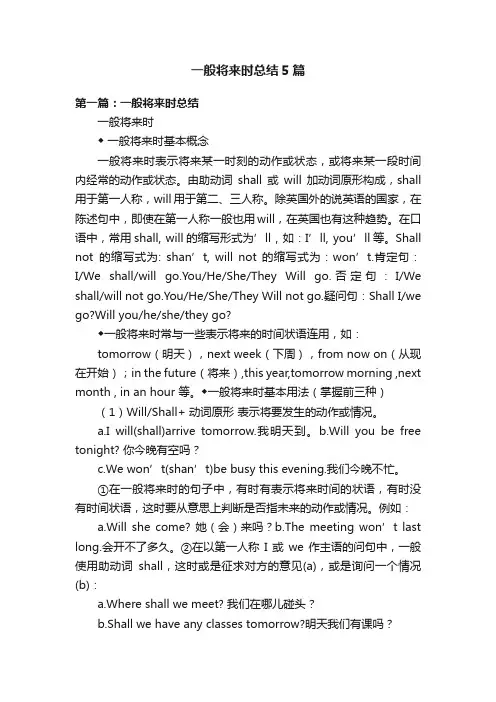
一般将来时总结5篇第一篇:一般将来时总结一般将来时◆ 一般将来时基本概念一般将来时表示将来某一时刻的动作或状态,或将来某一段时间内经常的动作或状态。
由助动词shall或will加动词原形构成,shall 用于第一人称,will用于第二、三人称。
除英国外的说英语的国家,在陈述句中,即使在第一人称一般也用will,在英国也有这种趋势。
在口语中,常用shall, will的缩写形式为’ll , 如:I’ll, you’ll等。
Shall not的缩写式为: shan’t, will not 的缩写式为:won’t.肯定句:I/We shall/will go.You/He/She/They Will go.否定句:I/We shall/will not go.You/He/She/They Will not go.疑问句:Shall I/we go?Will you/he/she/they go?◆一般将来时常与一些表示将来的时间状语连用,如:tomorrow(明天),next week(下周),from now on(从现在开始);in the future(将来),this year,tomorrow morning ,next month , in an hour 等。
◆一般将来时基本用法(掌握前三种)(1)Will/Shall+ 动词原形表示将要发生的动作或情况。
a.I will(shall)arrive tomorrow.我明天到。
b.Will you be free tonight? 你今晚有空吗?c.We won’t(shan’t)be bu sy this evening.我们今晚不忙。
①在一般将来时的句子中,有时有表示将来时间的状语,有时没有时间状语,这时要从意思上判断是否指未来的动作或情况。
例如:a.Will she come? 她(会)来吗?b.The meeting won’t last long.会开不了多久。
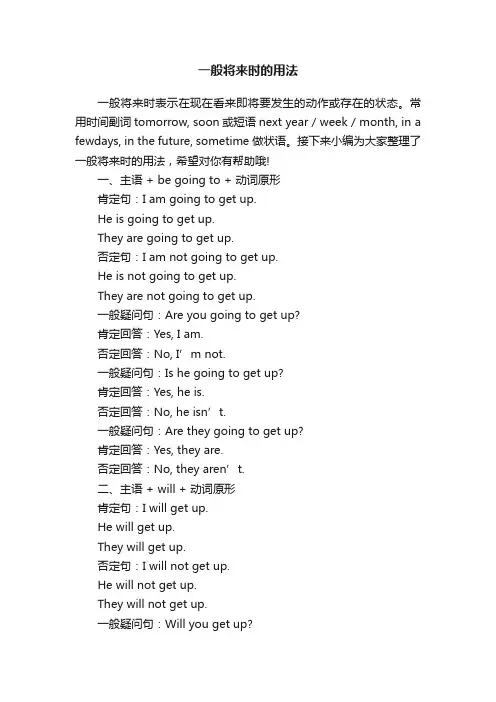
一般将来时的用法一般将来时表示在现在看来即将要发生的动作或存在的状态。
常用时间副词tomorrow, soon或短语next year / week / month, in a fewdays, in the future, sometime 做状语。
接下来小编为大家整理了一般将来时的用法,希望对你有帮助哦!一、主语 + be going to + 动词原形肯定句:I am going to get up.He is going to get up.They are going to get up.否定句:I am not going to get up.He is not going to get up.They are not going to get up.一般疑问句:Are you going to get up?肯定回答:Yes, I am.否定回答:No, I’m not.一般疑问句:Is he going to get up?肯定回答:Yes, he is.否定回答:No, he isn’t.一般疑问句:Are they going to get up?肯定回答:Yes, they are.否定回答:No, they aren’t.二、主语 + will + 动词原形肯定句:I will get up.He will get up.They will get up.否定句:I will not get up.He will not get up.They will not get up.一般疑问句:Will you get up?肯定回答:Yes, I will.否定回答:No, I won’t.一般疑问句:Will he get up.肯定回答:Yes, he will.否定回答:No, he won’t.一般疑问句:Are they going to get up?肯定回答:Yes, they are.否定回答:No, they aren’t.一般将来时/式(The Simple Future tense)时态定义be going to表主观的打算shall和will常常缩写成'll ,紧接在主语之后。
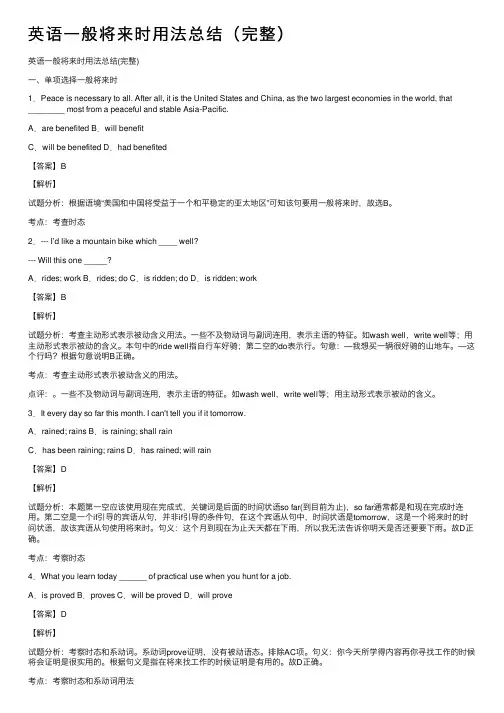
英语⼀般将来时⽤法总结(完整)英语⼀般将来时⽤法总结(完整)⼀、单项选择⼀般将来时1.Peace is necessary to all. After all, it is the United States and China, as the two largest economies in the world, that________ most from a peaceful and stable Asia-Pacific.A.are benefited B.will benefitC.will be benefited D.had benefited【答案】B【解析】试题分析:根据语境“美国和中国将受益于⼀个和平稳定的亚太地区”可知该句要⽤⼀般将来时,故选B。
考点:考查时态2.--- I’d like a mountain bike which ____ well?--- Will this one _____?A.rides; work B.rides; do C.is ridden; do D.is ridden; work【答案】B【解析】试题分析:考查主动形式表⽰被动含义⽤法。
⼀些不及物动词与副词连⽤,表⽰主语的特征。
如wash well,write well等;⽤主动形式表⽰被动的含义。
本句中的ride well指⾃⾏车好骑;第⼆空的do表⽰⾏。
句意:—我想买⼀辆很好骑的⼭地车。
—这个⾏吗?根据句意说明B正确。
考点:考查主动形式表⽰被动含义的⽤法。
点评:。
⼀些不及物动词与副词连⽤,表⽰主语的特征。
如wash well,write well等;⽤主动形式表⽰被动的含义。
3.It every day so far this month. I can't tell you if it tomorrow.A.rained; rains B.is raining; shall rainC.has been raining; rains D.has rained; will rain【答案】D【解析】试题分析:本题第⼀空应该使⽤现在完成式,关键词是后⾯的时间状语so far(到⽬前为⽌),so far通常都是和现在完成时连⽤。
一般将来时的用法及常见句型总结一般将来时是英语中用来表示将来发生的动作或状态的一种时态。
在句子中,一般将来时通常与表示将来的时间状语词搭配使用,如tomorrow(明天)、next week(下周)、in the future(将来)等。
同时,一般将来时也可以使用助动词will或shall来构成。
下面将介绍一般将来时的用法及常见句型。
1. 一般将来时的肯定句结构:主语 + will/shall + 动词原形 + 其他成分例如:- I will go to the park tomorrow.(我明天将去公园。
)- They will watch a movie tonight.(他们今晚将要看电影。
)2. 一般将来时的否定句结构:主语 + will/shall + not + 动词原形 + 其他成分例如:- She will not join the party.(她不会参加派对。
)- We shall not travel to Europe.(我们不会去欧洲旅行。
)3. 一般将来时的疑问句结构:Will/Shall + 主语 + 动词原形 + 其他成分?- Will you come to the concert?(你会来听音乐会吗?)- Shall we visit the museum tomorrow?(我们明天要参观博物馆吗?)4. 一般将来时的特殊用法:a. 表示计划或安排例如:- We will have a meeting next Monday.(我们下周一要开会。
)- They will go on a vacation in August.(他们八月份将去度假。
)b. 表示意愿或意图例如:- He will help you with your homework.(他愿意帮你做作业。
)- She shall buy a new car soon.(她打算很快买辆新车。
)c. 表示预测或推断例如:- It will rain tomorrow.(明天会下雨。
一般将来时基本用法一般将来时啊,这玩意儿可有意思了。
一、表示将来发生的动作或存在的状态1. 计划打算- 就像你说“我明天要去逛街(I'm going to go shopping tomorrow)”。
这就是你心里已经计划好了,明天有这么个逛街的事儿。
比如说你看到商场打折广告了,心里就琢磨着“我打算去看看有没有便宜又好看的衣服(I'm going to see if there are cheap and nice clothes)”。
- 或者你和朋友约好了,“我们下周打算去看电影(We are going to see a movie next week)”。
这就是提前有个计划,这个动作是在将来发生的。
2. 预测- 有时候呢,你可以根据现在的情况预测将来的事儿。
比如说“看这天,要下雨了(Look at the sky. It's going to rain)”。
你看到天上乌云密布的,就知道不久之后可能会下雨。
这不是你计划让天下雨,而是根据现在的情况做出的对将来的一种预测。
- 再比如“他学习那么努力,他会取得好成绩的(He studies so hard. He will get good grades)”。
你根据他现在努力学习这个情况,就预测他将来会取得好成绩。
3. 单纯的将来事件- 还有就是那种很单纯地说将来会发生的事儿,没有什么特别的计划或者预测的感觉。
像“火车十分钟后将离开(The train will leave in ten minutes)”。
这就是一个按照时刻表或者正常安排,在十分钟之后会发生的动作。
- 或者“明年我就18岁了(I will be 18 years old next year)”,这就是一个必然会到来的将来的状态,没什么特殊的计划或者预测的弯弯绕绕,就是时间到了就会这样。
一般将来时语法总结归纳一般将来时是英语语法中常用的时态之一,表示将来某个时间发生的动作或存在的状态。
本文将总结一般将来时的使用规则和相关的注意事项。
一、一般将来时的构成一般将来时由“will / shall + 动词原形”构成,其中“will”适用于所有人称,而“shall”仅适用于第一人称(I 和 we)。
例如:1. I will go shopping tomorrow.(我明天要去购物。
)2. He shall arrive at 5 p.m.(他将于下午5点到达。
)二、一般将来时的用法1. 表示自愿、决心或承诺一般将来时经常用于表示自愿、决心或承诺的动作。
例如:1. I will help you with your homework.(我愿意帮助你做作业。
)2. He will never smoke again.(他决心再也不抽烟了。
)2. 表示预测、推测或预计一般将来时可用于表达预测、推测或预计的动作或状态。
例如:1. It will rain tomorrow.(明天会下雨。
)2. They will probably win the game.(他们很可能会赢得比赛。
)3. 表示习惯或反复发生的动作一般将来时可以用来表示根据过去的行为或事件推断将来会发生的动作。
例如:1. He will often call his parents.(他通常会给父母打电话。
)2. They will always eat dinner at home.(他们总是在家吃晚餐。
)4. 表示请求、邀请或建议一般将来时也可用于表示请求、邀请或建议的动作。
例如:1. Will you please close the window?(请你关上窗户好吗?)2. Shall we meet at the café?(我们要在咖啡馆见面吗?)三、注意事项1. 否定形式将"will not"缩写为"won't",放在动词之前。
一般将来时语法知识点总结一般将来时是表示将来发生的动作或状态的一种时态。
一般将来时的构成由助动词“will”(或情态动词“shall”在第一人称单数中)+动词的原形组成。
以下是一般将来时的相关知识点总结:1. 肯定句结构:主语 + will + 动词原形 + 其他。
例如:- I will go to the movies tomorrow.(我明天会去看电影。
)- She will help you with your homework.(她会帮你做作业。
)2. 否定句结构:主语 + will not / won't + 动词原形 + 其他。
例如:- They won't come to the party.(他们不会来参加派对。
)- He will not eat meat anymore.(他不再吃肉了。
)3. 疑问句结构:Will + 主语 + 动词原形 + 其他?例如:- Will you join us for dinner?(你会和我们一起吃晚饭吗?)- Will they visit their grandparents this weekend?(他们会在这个周末去看望他们的祖父母吗?)4. 表示计划或意愿:表示将来的某个时间或做某件事情的打算或意愿。
例如:- I will study abroad next year.(我明年将出国留学。
)- They will buy a new car soon.(他们很快会买一辆新车。
)5. 表示预测或推断:表示将来的某个状态或事件可能发生,基于推测或判断。
例如:- It will rain tomorrow.(明天会下雨。
)- She will probably pass the exam.(她可能会通过考试。
)需要注意的是,一般将来时有时可用于表示即将发生的动作,而不一定是将来的某个时间。
例如,当说话人决定或做出决定时,也可以使用一般将来时。
一般将来时用法小结第一篇:一般将来时用法小结一般将来时用法小结:一般将来时表示在将来某个时间要发生的动作或存在的状态。
一.一般将来时的构成:1.由助动词“ shall/ will +动词原形”构成,shall 用于第一人称,will 用于第二、第三人称,2.一般将来时的否定和疑问形式:一般将来时的否定形式是will not,缩写为won't;shall not,缩写为 shan't。
一般将来时的疑问形式是把 will/ shall 提到主语前。
如:He won’t go to the park this Sunday.本周日他不去公园。
Will you go swimming with me? 和我一起去游泳好吗?二.一般将来时的基本用法:1.表示“纯粹的将来”:①表示将要发生的动作或情况,常带有表示将来的时间状语,如 tomorrow, next week, in two days, from now on 等。
如: It will be fine tomorrow.明天天气晴朗。
②表示预料将要发生的动作或情况。
如: You will feel better after having this medicine.吃了这药,你就会感觉好些的。
③表示由于习惯倾向而会经常发生的动作,本用法中的 will 要重读。
如: Boys will be boys.[谚语]男孩毕竟是男孩。
2.表示“带有情态意义的将来”,用来表示意图,用will 来表示。
如:I will be more careful next time.下次我要更加小心。
I won't go shopping this afternoon, but she will.今天下午我不想去购物,但她想去。
will 在疑问句中,用来表示有礼貌地征询对方的意见。
如:Will you have some more tea? 要不要再喝点茶?What shall we do this weekend? 本周末我们要干什么?三.一般将来时的其它几种表示法:1.用be going to 表示be going to 相当于一个助动词,与其后的动词原形一起构成句子的谓语,表示近期将要发生的动作或存在的状态如: I'm going to see a film this afternoon.今天下午我想去看电影。
一般将来时的用法一般将来时表示将来某一时刻的动作或状态,或将来某一段时间内经常的动作或状态。
一般将来时的用法有哪些呢?本文是店铺整理一般将来时的用法的资料,仅供参考。
一般将来时的用法一般将来时表示将来某一时刻的动作或状态,或将来某一段时间内经常的动作或状态.常常和表示将来的时间状语连用.如:tomorrow(明天),next week(下周),from now on(从现在开始);in the future(将来)等.一般将来时由助动词shall(第一人称),will(第二、三人称) 动词原形构成.美国英语则不管什么人称,一律用will.用法:(1)一般将来时表示将要发生的动作或情况.例如:I will(shall) arrive tomorrow.我明天到.Will you be free tonight?你今晚有空吗?We won’t (shan’t) be busy this evening.我们今晚不忙.(2)在一般将来时的句子中,有时有表示将来时间的状语,有时没有时间状语,这时要从意思上判断是否指未来的动作或情况.例如:Will she come?她(会)来吗?We’ll only stay for two weeks.我们只待两星期.The meeting won’t last long.会开不了多久.(3)在以第一人称I或we作主语的问句中,一般使用助动词shall,这时或是征求对方的意见(a),或是询问一个情况(b):a.Where shall we meet?我们在哪儿碰头?b.Shall we have any classes tomorrow?明天我们有课吗?在这类问句中,近年来也有不少人用will,特别是在美国.例如:How will I get there?我怎么去?(4)be going to 动词原形 a.表示计划、打算、准备做的事.例如:We are going to put up a building here.我们打算在这里盖一座楼.How are you going to spend your holidays?假期你准备怎样过?b.表示即将发生或肯定要发生的事.例如:I think it is going to snow.我看要下雪了.There’s going to be a lot of trouble about this.这事肯定会有很多麻烦.一般将来时的其他用法一般将来时表示将来某一时刻的动作或状态,其表达形式除了“shall(第一人称),will(第二、三人称)+动词原形构成”外,还有以下几种形式.一.“be going to+动词原形”表示即将发生的或最近打算进行的事.例如:①It is going to rain.要下雨了.②We are going to ha ve a meeting today.今天我们开会.二.go,come,start,move,sail,leave,arrive,stay,live,fly,等可用进行时态表示按计划即将发生的动作,例如:I'm leaving for Beijing.我要去北京.三.“be to+动词原形”表示按计划要发生的事或征求对方意见.例如:①Are we to go on with this work?我们继续干吗?②The boy is to go to school tomorrow.这个男孩明天要去上学.四.“be about to+动词原形”表示即将发生的动作,意为:很快,马上.后面一般不跟时间状语.例如:We are about to leave.我们马上就走.五.某些词,如come,go,leave,arrive,start,get,stay ,live,fly等的一般现在时也可表示将来.①The meeting starts at five o'clock.会议五点开始.②He gets off at the next stop.他下一站下车.六.“be due to"构成的谓语,意味“定于…”也可表示将来时.百度百科上有详细介绍,很全面的哦.一般将来时基本用法一般将来时构成如下:肯定式疑问式否定式疑问否定式I shall work Shall i work? I shall not work Shall i not work? He(she,it) Will he (she,it) He(she,it)will not Will he (she,it) not We shall work Shall we work? We shall not work Shall we not work? You will work Will you work? You will not work Will you not work? They will work Will they work? They will not work Will they not work?其结构有如下几种: 1)will + 动词原形(will可以用于任何人称) 需要注意的是当主语是第一人称时will可以换成shall,特别是在以I或we 作主语的问句中,一般用shall. 例. Shall we go to the zoo? 2)be going to +动词原形第一种结构的句式变化是: 变否定句在will后边加not. 变一般疑问句把will提前. e.g. She will come back in three days. She will not come back in three days. Will She come back in three days? 第二种结构的句式变化要在be上做文章. E.g. They are going to clean their classroom. They are not going to clean their classroom. Are they going to clean their classroom?一般将来时基本用法如下:1 一般将来时用来表示纯粹的将来事实。